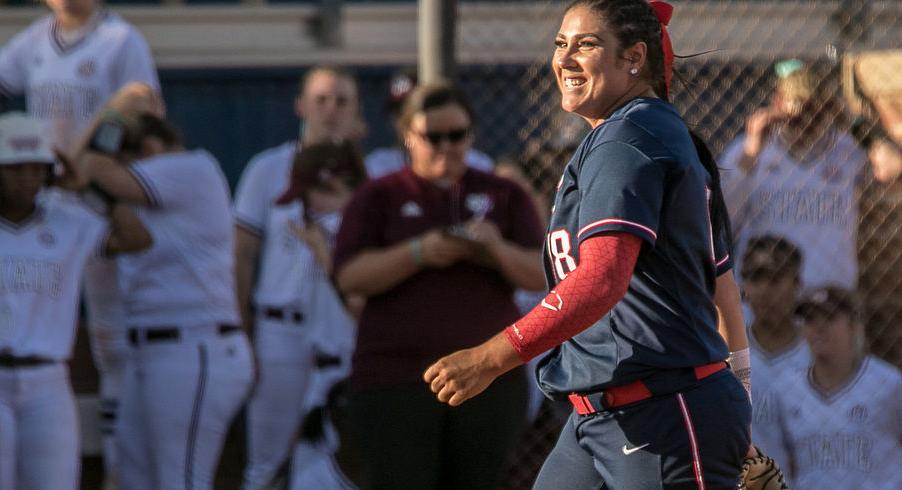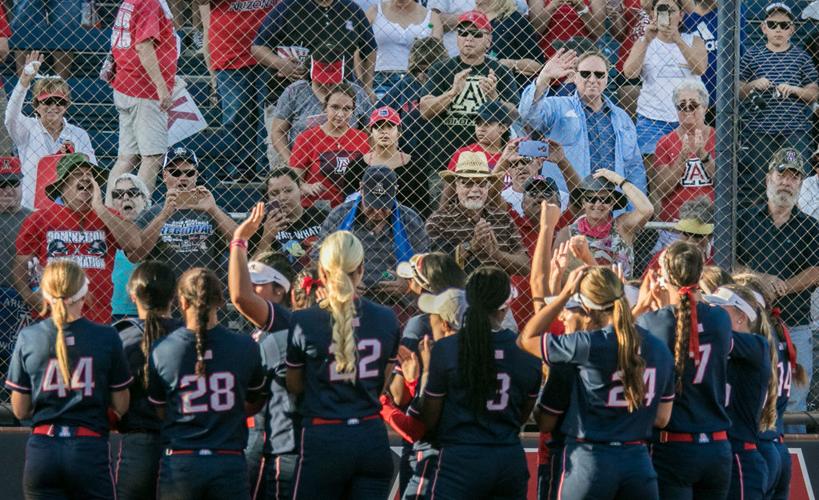UCLA’s softball operation was once so feared that the Bruins’ historically dominant pitcher was named Doom.
Debbie Doom.
When Mike Candrea was hired to coach Arizona’s softball program in 1986, Doom went through a 102-inning streak without giving up a run. Doom’s Bruins won three NCAA championships and owned the plate in college softball.
To make it sting a bit more, Doom grew up in Tempe and chose not to play for the pre-Candrea Wildcats.
It took Candrea what seemed like forever – six years – before he chopped down the softball monster that was UCLA and beat the Bruins in the 1991 national championship game.
It took him a lot longer, until 1997, before he got out of softball debt and had a winning record, 29-28, against the Bruins. That was the only time any Pac-12 school had a winning record against UCLA. Alas, it was fleeting, gone by 2010.
Candrea is now 56-71 against the Bruins and except for those in the locker room at the UA’s Hillenbrand Stadium, there isn’t a soul on the softball planet who expects the Wildcats to beat UCLA in the Super Regionals this week at Easton Stadium.
If you touch on that topic, or deliver a question with just a hint of UCLA-laden awe, Candrea gives you a you-must-be-new-here look.
He talks about his ’91 team, which stunned the heavily favored Bruins 1-0 and 5-1 at the Women’s College World Series.
“We walked in against a very hot pitcher, Lisa Fernandez, who hadn’t been beaten,” he said Monday. “We walked in there with a blue-collar team and kind of put it together at just the right time. That was the beginning of it.”
The “beginning of it” is reference to the Arizona-UCLA softball series, which is the best of its kind in college softball. Candrea’s players weren’t born when Arizona won that ’91 championship, but all seem to know the history.
“People always talk about our rivalry with ASU, but I don’t think anything compares to this one,” said first baseman Alyssa Palomino. “There’s so much history there; it’s just a battle all the time.”
Arizona ace Taylor McQuillin agreed. “Obviously, this is one of the biggest rivalries, ever, all time, in college softball,” she said.
Palomino and McQuillin grew up versed in the UCLA-Arizona rivalry long before they enrolled at the UA. They played for the Orange County Batbusters travel team, a national power that has blessed Arizona with four-star prospect upon four-star prospect.
Their chief travel-ball rival was often the Corona Angels, which produced the Pac-12 Player of the Year, UCLA pitcher-hitter Rachel Garcia, and starting left fielder Kinsley Washington, among others.
The most intriguing part of the UCLA-Arizona rivalry is that the Bruins rarely go outside the state lines to recruit; all of their 2018 starters are from California. Arizona grew to power — eight NCAA championships — because Candrea was the first non-UCLA coach to bite into the Bruins’ SoCal recruiting territory.
Most of the top names in UA softball history are from SoCal: Jennie Finch, Nancy Evans, Jenny Dalton, Laura Espinoza, Alison McCutcheon, Amy Chellevold and on and on.
Louisiana-Lafayette transfer Aleah Craighton is the only full-time Arizona starter not from SoCal.
“Beating UCLA in ’91 was a big step for our program,” said Candrea. “We started to get the top kids out of Los Angeles for the first time. There are and will always be a lot of kids from L.A. who don’t want to leave L.A., but others have a different opinion and want to get out of there.”
Of recent vintage, Candrea signed All-Pac-12 shortstop Jessie Harper, who grew up 25 miles from UCLA. The Bruins didn’t pursue Harper. Such is this series.
Because Oregon and Washington have become steady World Series contenders, and because Arizona State has periodically been a top-10 program, the UA-UCLA series isn’t as visible as it used to be. In addition, the Pac-10 changed its scheduling format and eliminated home-and-home series in 2010.
And, frankly, the Bruins have been rolling. Believe it or not, Arizona has won just a single series against UCLA since 2004 and is 10-35 overall in that period.
In a sense, Candrea is again fighting the UCLA softball monster the way he did from 1986 to 1991. Playing the Bruins at Easton Stadium has never been a prescribed route to get to the Women’s College World Series, or anywhere, and especially not now.
The NCAA Tournament selection committee probably erred by seeding Arizona No. 14, a few spots too low, which made the Super Regional trip to No. 3 UCLA inescapable.
Ideally, the Wildcats should’ve been a No. 10 seed, playing this week at more manageable No. 7 Georgia, or even at No. 8 Arizona State.
“I quit worrying about the (seeding process) many years ago,” said Candrea. “If you try to ask someone exactly what goes into the selection process, you get 10 different answers.”
So this week, for the first time in history, Arizona and UCLA will meet in a postseason game that isn’t the Women’s College World Series.
Doom? Doomed? Probably not, or not for long.
Arizona returns seven starters in 2019, plus pitching/hitting recruit Marissa Schuld of Phoenix, who looks to be a potential difference-maker. The Bruins lose just one starter.
Whatever happens this week in LA, this could be the re-start of something big.





